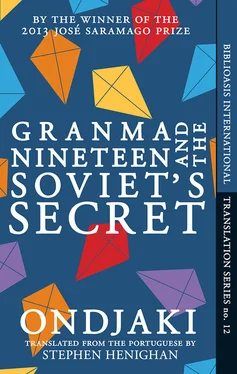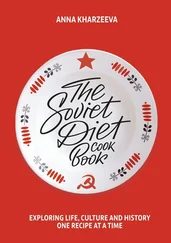So as not to appear undisciplined, I remained silent when the Comrade Teacher ordered me to tear up the three compositions, but I felt like laughing because of course Uncle Victor didn’t have enough Coca Cola to fill a swimming pool, but we all knew that Granma Catarina was in Granma Nhé’s house; she even opened and closed windows. It was just that she didn’t like to appear very early in the day or when there were strangers in the house, but that didn’t mean that she wouldn’t have wanted to go with us to Benguela.
“What are you thinking about, son? Finish your bread.”
“About a composition I wrote… Granma Catarina was in it. I still think she didn’t go to Benguela just because nobody invited her.”
“Finish your bread, son. Today I have to go to the hospital to have a toe removed.”
“And after that we’re really going to call you Granma Nineteen?”
“I suppose so.”
We were just about to leave. Granma Nhé’s bag was ready, with her nice silk nightgown and her Chinese slippers.
Granma looked slowly around at the whole room — the windows, the carpet, the beat-up brown sofa, the really old wood-framed television, the photos on the walls — and stopped to look at the display cabinet containing the pretty Chinese tea service.
“The first granddaughter who makes a proper marriage gets that tea service. We’ll see who it is.”
“These days nobody marries as a virgin.” Granma Catarina appeared out of nowhere.
“Catarina, I’m going to the hospital. But first I’m going to the cemetery.”
“Take advantage of the opportunity to tell your grandson the truth.”
“I’ll only be back tomorrow morning, if the doctor lets me.”
“The truth, Agnette. You have to tell the children the truth.”
“Goodbye, Sis. Till tomorrow.”
“Goodbye.”
“See you, Granma Catarina.”
“See you, son. Look after your Granma.”
Granma Nhé went out carrying her bag. Senhor Osório, who was going to give us a lift, had already honked twice. Granma Catarina stayed near the door to watch me while I went down the steps of the veranda.
“Even if you don’t see me, I’m nearby. Life is also made up of things that we don’t know how to explain but which are always there.”
“I didn’t understand anything, but I’m going to give you a kiss.”
Granma Catarina didn’t leave the doorway. It was as if there were a fox trap there that she couldn’t tread on. She looked in the direction of the enormous trees of Dona Libânia’s house, and she smiled.
“You see the mills?”
“Those are trees, Granma Catarina. Big, beautiful trees.”
“But they look like mills of time.”
“I’m sorry, Granma. It’s just I don’t know what mills are and I’m really late.”
“They’re big spades that help to push time forward.”
“What pushes time forward, at least as I’ve seen it being pushed, are the hands of the clock,” I shouted as I ran for the car.
“It’s the same, my dear.”
We went in Senhor Osório’s car. He was already pretty much a friend of the family and drove a white Opel that ran on diesel fuel. Before turning the key in the ignition, it was necessary to wait for a pretty blue light that came on; only after that was the car warmed up. I met Senhor Osório when I was little and he used to visit Uncle Chico at his house with the wonderfully chilled beer that came out of the faucet installed in the wall.
“Are you all right?”
“Good, thanks, Senhor Osório.”
“Ready to go for a spin?”
He always drew a deep breath — I’d never seen a person who made so much noise with his breathing — once the blue light came on. He started the car. That Opel was pretty: all white, and always freshly polished and washed. Senhor Osório actually worked for Opel and I guess he must have washed his car several times a day; at least I never saw it dirty. Seated, he succeeded in straightening his slacks, that’s to say, everybody knew that Senhor Osório was notorious as “slacks-up-to-his-armpits” because he pulled his slacks up until they almost touched his armpit, in spite of his handsome belly and wide suspenders.
“We’re going to High Cross Cemetery, please, Senhor Osório.”
“All right, Dona Agnette.”
I opened the window to sniff the odours from the sea because we were certain to follow the shore of Bishop’s Beach, that’s to say, close to the sea, and after the Fortress we were going to turn onto the Marginal, and since Senhor Osório drove really slowly, I had time to say hi to Charlita and 3.14, who shouted, “Good luck.” The Comrade Gas Jockey waved a languid goodbye, Sea Foam was at his house’s front gate, fanning his leg with his whip and a chain in the other hand; the church was closed, but a few cleaning ladies were sweeping the dusty patio, though I don’t know why they bothered to sweep it since the same dust was going to return to the same places. On the lefthand side was the calm, peaceful sea with the sun’s patterned light shining on it and some fishermen going out to fish. Then came the Marginal — the wide street of the Marginal — still with only a few cars, and the beautiful building of the National Bank of Angola, and when we got close to the Nazaré Church, we curved to take the Eixo Viário, this time in the direction of the cemetery.
“Are you coming in with us, Senhor Osório?”
“No, Dona Agnette. I’m not in the habit of entering cemeteries.”
“What will you do the day your mother passes away?”
“My dear mother is already deceased, Dona Agnette.”
“You didn’t go to the burial?”
“I was here in Angola. She died in Portugal.”
When we arrived there were lots of ladies outside the cemetery selling flowers of all colours, those really big ones that they put on the coffin once it’s closed and other, smaller ones to be carried in the hand or offered to those who cry the most. As it was a weekday, there wasn’t much crying or wailing going on.
“Instead of planting flowers in gardens, they bring them to cemeteries where nobody cares any more.”
“Don’t you like flowers, Granma?”
“I like them, son, but I like to see them in gardens and along the streets to give life some colour. Death hasn’t got any colour, son.”
“Granma Catarina says that, too.”
“Let’s go in. Can you manage to carry that big bottle?”
“I can carry it, Granma.”
The big bottle of water was to clean off Granpa Mbinha’s headstone, which was filthy because Granma Nhé only came to visit it once a year, on Granpa’s birthday.
“Let’s go look for the headstone. I never know exactly where it is.”
I liked this part because, to tell the truth, I think this was just Granma Nhé playing around. She knew very well where the headstone was; even I could almost get there with my eyes closed. But that was how this worked: we went wandering around and stumbling over other headstones and she told me little tales. I never completely understood whether this was a way to make me aware of certain things, or whether it was just to tame her own sad yearning for people she hadn’t seen in a long time. “This headstone belongs to the late Don Tito, Carmen Fernández’s father, who died of heartbreak when he learned about her giving birth to the bag of ants.” She poured out a few drops of water, arranged the dry but pretty flowers that someone had left there a long time ago. “Here lies the late Barradas, father of that Barradas who was famous all the way to the Workers’ District for being excessively endowed.” I didn’t really understand. “Endowed, Granma?” She smiled, wiping the tears from her eyes. “One day Granma will tell you the tale of how Barradas got ready to play soccer and then the tale of the blind woman who started shouting.” She blew on other headstones, looked at the little photographs behind broken glass, brushed away leaves. “Here’s Senhor Santos, Granma Chica’s husband. Yes, they sure had a nice wine cellar. Clean that photograph well.” The gravediggers started to approach us to ask if we needed help. Granma didn’t want any help, she was even willing to give them money, but Granma Nhé didn’t like to have a lot of people around her in the cemetery.
Читать дальше












